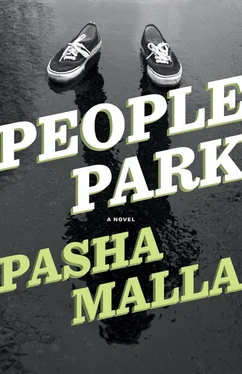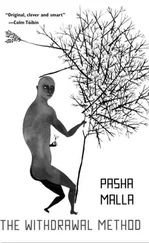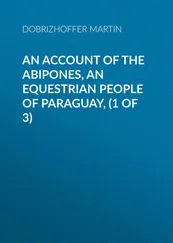The Galleria offered a reprieve from the crowds and heat, yet suggested the choked stillness of an aftermath. The storefronts had been smashed, goods rooted through and taken. Debbie hoped pillaging had at least remained practical — food, water, emergency supplies. Though as she was thinking this a young man trotted past shouldering a TV.
In Bargain Zoom a woman was dumping tins of corn-in-a-can into a shopping cart also shared by two children. Debbie called, Is it upstairs they’re holding people? The woman spun, eyes narrowed, and screamed, You can’t stop me, what’s to stop me, her kids kneeling wide-eyed amid a clutter of tins. It’s everyone for themself, she hollered, and wheeled down the aisle.
Each store bore evidence of looting, shelves upended, racks overturned, cash registers hung open like skulls with their tongues lolling out. For some reason a small fire smouldered on the reception desk of Horizon Systems, and the lottery booth had been relieved of all its tickets — to which lottery now? As Debbie reached the foodcourt a group of four middle-aged people went racing past, arms full of boxes of cider powder, followed by a friend wearing eight pairs of sunglasses and lugging a bulging knapsack.
Debbie walked the out-of-service escalator, climbed over spilled clothing racks up top. The first store was Baldini & Vogl’s Music. She peered through the lock-down grate into the gloom. At first all she could make out were the coffinlike shapes of pianos. But something stirred: the murky lumps lining the aisles were people. They sat on the floor in rows, dozens of them, faces indistinguishable. No one spoke. The only sound was the whisper of a ventilation duct.
I’ll get you out, she said. Don’t worry, she said, I’ll get you out.
No response. Not a word, not a flinch. Did they even see her? And then one of them stood and came lurching out of the dim. Shirtless, wearing a welding mask, he stood unspeaking on the other side of the grating. . staring at her? In the visor Debbie saw only herself. A chill slithered through her body, as a ghost through a wall.
I’ll get you out, she said weakly, backing away, and ran down the escalator and into the northern quadrant, where water was flowing in from Topside Drive, deepening as she went. From Citysports emerged the four-legged beetle of a portaged canoe. The canoe was lowered, flipped with a splash onto the shallow water, its liberators stood over it wielding paddles. And Debbie was relieved to see familiar faces: the most recent additions to the Restribution Movement, the student couple whose names she’d yet to learn.
Guys!
They looked at her blankly. And, with recognition, impatience.
There’s people upstairs, Debbie said. We need to save them.
The only person to save is yourself, said the girl. No one else will.
Not the NFLM, not Raven, said the boy. They were trying to deport us!
This boat’s only big enough for us though, said the girl. Sorry.
I mean, we’re sorry, said the boy, steadying the canoe as his girlfriend climbed aboard.
It’s okay, said Debbie.
Water gushed into the Galleria from the north. From their seats, bow and stern, the students looked up at her. Give us a push? said the boy. Please, said the girl.
Debbie swivelled them north. Straight across the Narrows, she said. Good luck.
We’ll see you on the other side, said the girl.
For sure, said the boy.
They went paddling out the doors and out of sight. Water rippled up Debbie’s shins. She thought for a moment to just lie down, let it wash over and take her wherever it might run. But there were people to help. She procured boltcutters and a flashlight from Citysports, went back upstairs — and discovered Baldini & Vogl’s empty.
Empty, yet without any indication of forced entry or escape. The flashlight danced up and down the vacant aisles. The store’s austere duskiness suggested a widow’s parlour. Debbie squinted, maybe they’d made their getaway through an air vent. But the ducts were bolted closed from inside the store. Had she imagined the captives? Had the gloom played tricks on her eyes? But what of the shirtless guy who’d come to the grate? He’d been real. Debbie had seen her own reflection in his mask.
She sensed someone behind her, tensed, turned. Only the woman from Bargain Zoom, the one with the shopping cart, though she’d ditched it, and seemingly also her children. She pointed at the boltcutters. You using those?
They were eased from Debbie’s hands. The woman grinned wildly into B&V’s, at all that stock for the free-and-easy taking. I’m not a musician, she explained, as she set to shearing the lock, but this shet’s worth its weight in schnapps.

THE DECISION was sudden and collective: people started climbing down onto the tracks, hands were offered, children were passed below into strangers’ arms and reunited swiftly with their parents, the exodus downtown began. A contingent chained up to block the electrified rail. Just keep going, someone advised, stay calm, stay together, we’ll get there together.
The old man couldn’t get down. Blocking Pearl’s way, he wagged his cane into the empty space, crouched, extended a foot, retracted it again. Someone pushed past Pearl muttering, Enjoying the show? This person took the fellow under his armpits, two other people supported his legs, together they lowered him down.
The first person asked him, You okay to walk? and the old man laughed, twirled his cane, said, You go on, don’t worry about me, I got here fine, I’ll get out at my own speed. But they wouldn’t, instead yoked his arms over their shoulders. Am I a wounded soldier? the man laughed, embarrassed, yet allowed himself to be carried.
Ignoring a woman asking for help with her stroller — why’d she bring a stroller ? — Pearl hopped down, she had to find her son. As she walked she leafed through the Grammar , though this was dicey, she had to keep checking her footing from one tie to the next, and the text was a mash of arcane language — An Object of Whose Possession He Is Jealous, A Victim of the Mistake, A Cause or Author of the Mistake. .
Gip’s face hovered in her thoughts, a pleading look in his eyes, but she couldn’t picture the rest of him — bodiless, an apparition. She returned to the Table of Situations, and there it was, the book’s final chapter: Recovery of a Lost One. Pearl flipped to it greedily. But the section was blank, all the way to the end, page after page wiped clean.
Pearl stumbled, nearly fell, someone seized her arm, told her, I gotcha — probably best to save the book for later, to which Pearl replied feebly, I’m trying to find my son. Someone passing heard this and laughed: She’s trying to find her son! and someone else said, You’re the only one, lady! And the person who’d helped her, a woman in a Y’s cap, suggested, We’re all trying to find someone, hey?
Shaded by the cap’s brim the woman’s eyes were kind: she’d spoken not from scorn, but solidarity, and her grip was gentle. People streamed past, giving them room. If you’re all right, said the woman, we should get going. Looping arms she and Pearl, as teammates in a three-legged marathon, rejoined the march.
Y’s fan? Pearl asked. The woman said, You bet. I used to play for them, Pearl said shyly, and her arm was squeezed and she was told, I know, I know who you are. . Pearl, right? This was dizzying — her own name, spoken aloud, amid all this! Like being kissed. Yes, she said, with the grace of a prayer: Pearl. That’s me, yes.
They spoke of their families — the woman was searching for her two girls, they’d stayed over at friends’ places in Bebrog. While she’d dispatched herself to find them her husband, an NFLM Helper, was rescuing stranded westenders in a catamaran. People Park’s where everyone’s going, she said, that’s where I’ll find my daughters. What conviction, Pearl thought, tightened her grip on the Grammar , leaned close, and said, What about my son? Don’t worry, the woman said, he’ll be there too. Everyone will.
Читать дальше













